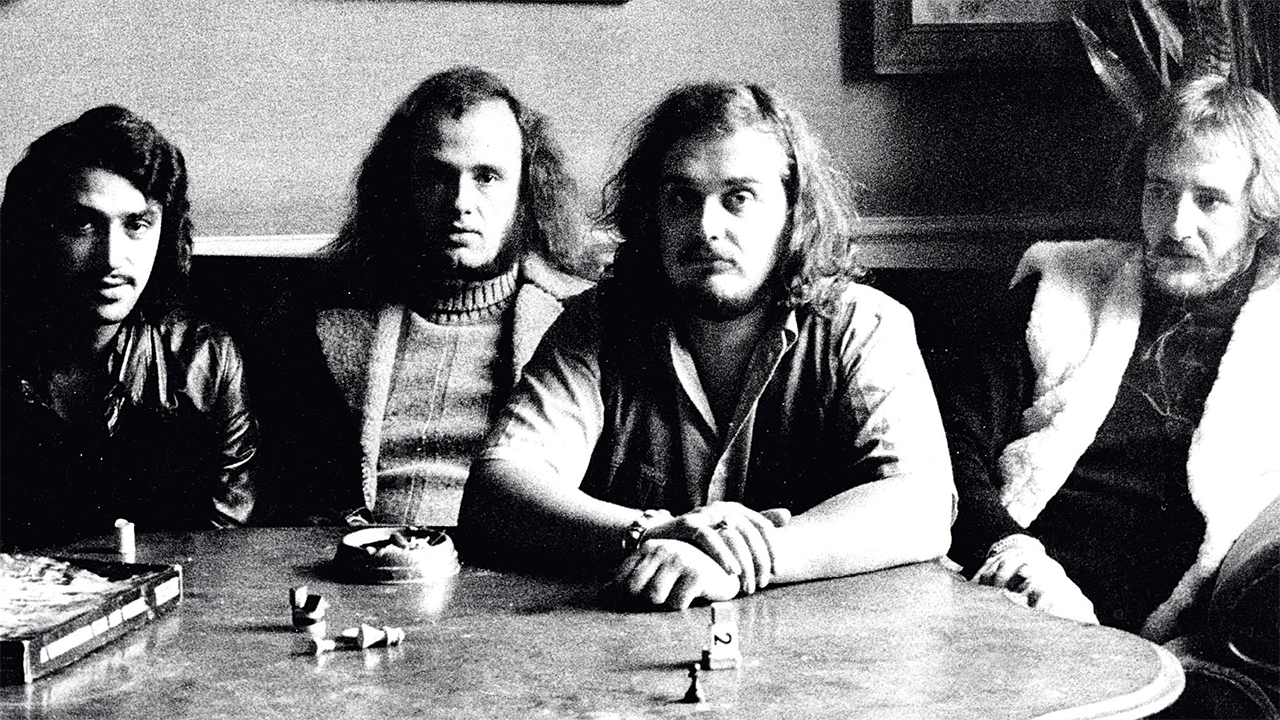“It’s heraldic. It’s funny. It’s virtuoso and also really stupid! I wouldn’t change a note”: Simple ideas and happy accidents propelled a Dutch band’s second album to the pinnacle of prog. And yodelling.
Master craftsmen’s 1971 release was a unique fusion of ingenuity, passion and febrile chemistry – plus some tension – and they never looked back

Select the newsletters you’d like to receive. Then, add your email to sign up.
You are now subscribed
Your newsletter sign-up was successful
Want to add more newsletters?

Every Friday
Louder
Louder’s weekly newsletter is jam-packed with the team’s personal highlights from the last seven days, including features, breaking news, reviews and tons of juicy exclusives from the world of alternative music.

Every Friday
Classic Rock
The Classic Rock newsletter is an essential read for the discerning rock fan. Every week we bring you the news, reviews and the very best features and interviews from our extensive archive. Written by rock fans for rock fans.

Every Friday
Metal Hammer
For the last four decades Metal Hammer has been the world’s greatest metal magazine. Created by metalheads for metalheads, ‘Hammer takes you behind the scenes, closer to the action, and nearer to the bands that you love the most.

Every Friday
Prog
The Prog newsletter brings you the very best of Prog Magazine and our website, every Friday. We'll deliver you the very latest news from the Prog universe, informative features and archive material from Prog’s impressive vault.
For their second album, Focus passed on the chance of working with George Martin, employed Fleetwood Mac’s producer instead, and then proceeded to commit a carefully drilled, concert-tested set of songs to vinyl. Then, without warning, their singer started yodelling in the studio. In 2012 Prog explored the history of 1971 release Moving Waves.
The progressive rock explosion was in full flight in the UK as the evolutionary surge of the 60s gave way to the white-knuckle ride of the 70s. And although the majority of prog’s great and good hailed from Britain, notable European counterparts were making significant contributions to the genre’s development.
No band left a more indelible fingerprint on the contract between music and invention than Holland’s mighty Focus. Formed by frontman, flautist and self-styled “disturbance clown” Thijs van Leer in 1969, they’d produce some of the best loved and most widely recognised music to ever bear the prog banner.
Curiously, though, van Leer insists he’s never had anything to do with the prog rock scene. “Not at all!” he booms cheerily. “I liked classical music like Bach and Bartok and that kind of thing. I was raised in a classical family. Then I was a jazz fanatic, playing Miles Davis and John Coltrane pieces with bands.
“It was only later that I became interested in rock music. I didn’t like most of it; I just thought it was good for dancing to at parties! Then suddenly I discovered the lyrics of Bob Dylan and other singer-songwriters. That was a new world for me. I was suddenly a fan of rock, but not especially prog rock, because ‘prog’ didn’t really exist as a word. Now we are considered to be godfathers of prog – that’s ridiculous to me!”
Focus recorded their debut album, In And Out Of Focus, at Sound Techniques Studios in London with producer Herbert Terheggen. Having played live extensively, the band were already masters of both improvisation and the skilled co-opting of classical themes. But it would take a catchy two-minute instrumental to win people over in their homeland and beyond.
Guitarist Jan Akkerman’s House Of The King – which was to become famous in the UK as the theme for science TV show Don’t Ask Me, presented by the eccentric Dr Magnus Pyke – was not even featured on the original Dutch version of the album. But its irresistible refrain soon propelled Focus into the spotlight.
Sign up below to get the latest from Prog, plus exclusive special offers, direct to your inbox!
“House Of The King was the first song that was picked up by famous DJs in Holland, on the pirate ships like Veronica,” van Leer recalls. “Then all the pirate stations started to play it. Suddenly people said we were making interesting music, just because we’d had a hit!”
Focus went through a period of renewal in 1970. Although he admits now that decision caused him “a lot of pain,” van Leer bade farewell to bassist Martin Dresden and drummer Hans Cleuver. At the request of the recently recruited Akkerman, his longtime collaborator Pierre van der Linden was installed on the drum stool; and bass player Cyril Havermans, completed the new line-up, who embarked on an adventure that would change their lives forever.
Recorded at Sound Techniques and Morgan Studios in London in the spring of 1971, with producer and blues guru Mike Vernon at the controls, Moving Waves was to have an impact far beyond anything that van Leer might have imagined when he began his career. “We asked Mike because he was the producer of Fleetwood Mac’s first album,” he recalls. “We were very impressed with the sound of Albatross and that’s why we asked him.
“We all had a great rapport with him. He’d produced a lot of English soul records and a lot of blues. He was pretty serious and very efficient – but also very funny. Moving Waves was recorded in two days… not like Def Leppard using a studio for a year and a half!”
With most of their second album already written and finely-tuned through many live performances, Focus were more than ready to record. But as van der Linder remembers, the sessions were not as smooth as they’d hoped.“There was a lot of tension,” says the drummer. “There were a lot of fights between Jan and Thijs. They came from very different families; Jan was more from the street. I was somewhere between them! But it was a very special time.”
Although they scored a hit with Sylvia in 1972, there’s no doubt that Focus will always be remembered for is Moving Waves’ thunderous opening track Hocus Pocus. But its birth was nowhere near as calculated as one might expect from such a hook-strewn piece of riff-driven rock. Unlike the rest of their new material, primarily composed by van Leer or Akkerman, Hocus Pocus was an inspired collision of simple ideas and happy accidents.
“It was the only song that was not prepared at home,” says van Leer. “It came about during a jam when Jan began playing the riff. He played it four times and then stopped. The drummer did two bars of a basic solo, and I just started to yodel spontaneously – for the first time in my life! That’s how it was done: it was written in three minutes and became our big hit. It’s amazing. The guitar riff is one of the greatest ever created by human beings. I had a feeling we could conquer the world with just that one riff.”
Van der Linden recalls: “It was very rocky, with lots of guitar solos and drum fills, and then Thijs said, ‘Let’s try some yodelling!’ At first it was a joke,but then we kept it that way because the reaction from people was so positive.”
“We created the song in a castle called Groeneveld,” van Leer adds. “It was an inspiring place. Do you know who came there for three days because he wanted to be our producer? George Martin! We said, ‘How quick could we go into the studio?’ and he said, ‘A year from now, because I have to work with Jeff Beck’. So we said no. How stupid can someone be?”
Although somewhat overshadowed by Hocus Pocus, the rest of Moving Waves offered a similarly bewildering level of invention and diversity. Ranging from the elegant and fragile Janis through to the gargantuan piece-de-resistance of the 23-minute Eruption – which dispels van Leer’s argument that Focus are not prog – the album that stridently established its creators’ abilities as composers and musicians, while also brilliantly assimilating the prog rock ethos into their idiosyncratic sound.
“Some songs we’d played on stage already, but there are some that we never played live, like Janis,” says van der Linden. “That was born in the studio. Hocus Pocus was recorded very quickly; Eruption too, because we’d played it on stage many times already. We changed some of it, but not very much.”
“We worked on Eruption a lot when we wrote it,” says van Leer. “It was about a lot of different sides of the human psyche – it’s the human eruption. That’s why the themes are seemingly conflicting, but in the end they have harmony.”
“Thijs wrote the different parts for Eruption and then we improvised around those,” the drummer says. “I think we went very far musically for the time. We were way ahead of the pop groups. It was very complex and constantly developing – that was the most important thing for us.”
Buoyed by the success of Hocus Pocus, Moving Waves was released in October 1971 and became a huge hit in the UK and, eventually, the US. the band spent the following year on a world tour, sharing stages with Gentle Giant, Santana, Frank Zappa and Chick Corea. As the prog movement began to dominate charts across the globe, Focus were living the rock ’n’ roll dream. But van Leer says it was both a blessing and a curse.
“I had already smelled success; I was not so amazed that the halls became bigger after Moving Waves,” he says. “We were headlining instead of supporting. But going on long tours changed our lives in many ways. It made my first marriage into a disaster because I was never home.”
Moving Waves is an undisputed classic; the album for which Focus will always be celebrated in prog circles and elsewhere. As its title suggests, it’s a snapshot of a band in a state of creative flux, intertwining ingenuity, passion and febrile chemistry. And, of course, yodelling.
“I wouldn’t change a single note of Moving Waves,” says van Leer. “I love it. It has a mystic value, connotations of the Middle East, all those open chords. It’s heraldic in a way. It’s also funny. It’s virtuoso and it’s also really stupid! I’m very proud of what we did.”

Dom Lawson began his inauspicious career as a music journalist in 1999. He wrote for Kerrang! for seven years, before moving to Metal Hammer and Prog Magazine in 2007. His primary interests are heavy metal, progressive rock, coffee, snooker and despair. He is politically homeless and has an excellent beard.
You must confirm your public display name before commenting
Please logout and then login again, you will then be prompted to enter your display name.



